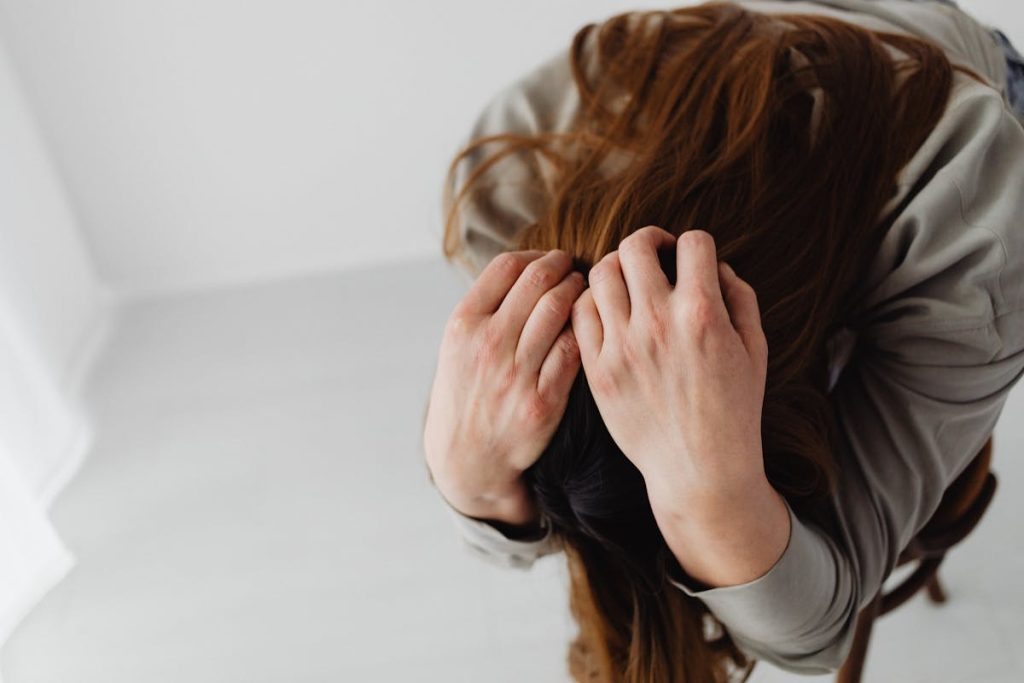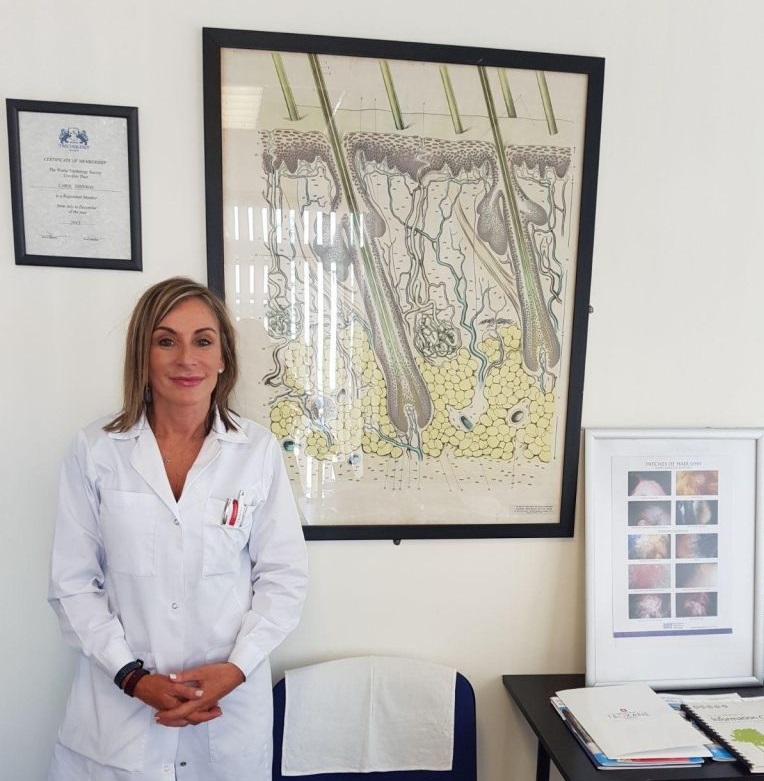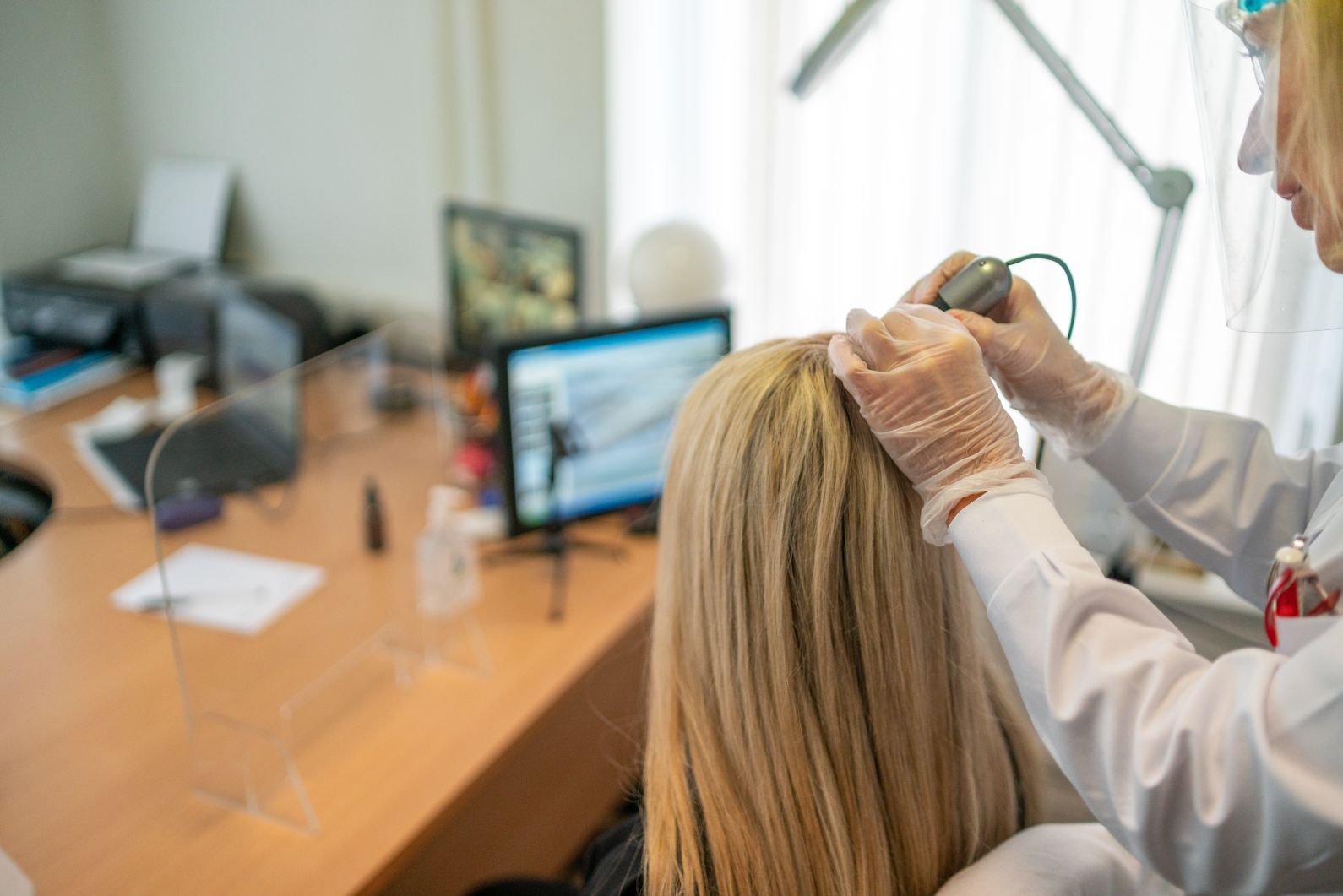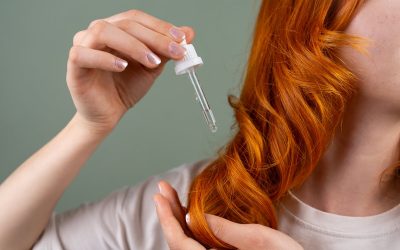Covid-19 has profoundly impacted many people’s lives, affecting their physical and mental well-being in numerous ways. One lesser-known consequence of the virus is hair loss in the months following infection. While not widely discussed, this condition, often referred to as Covid hair loss, is becoming increasingly acknowledged among the healthcare community and recovering patients alike.
In understanding this condition, it’s clear that the impact of the virus extends beyond its immediate symptoms. It has left many people feeling concerned and self-conscious. If you are one of them, read on to learn more about hair loss after Covid, including its symptoms and treatments.
Understanding Covid Hair Loss
As the name suggests, excessive hair shedding happens after suffering from or contracting Covid-19. Experts believe that this type of hair loss is due to a condition called telogen effluvium. This condition accelerates the natural cycle of hair follicles, pushing them into the resting phase earlier than expected. This results in increased hair shedding and thinning across the scalp.
Telogen effluvium has several triggers, including severe illness. In the case of Covid hair loss, it’s brought about by the physiological stress induced by viral infection coupled with high fevers—a frequent symptom of Covid-19—and the emotional stress from battling the illness.
Understanding the triggers and mechanisms behind this type of alopecia is crucial in developing an effective hair recovery strategy. While Covid-induced hair loss may be alarming, it’s vital to remember that this condition is generally temporary.

How Long Does Hair Loss After Covid Last?
The duration of Covid hair loss can vary greatly from person to person. While some individuals may experience noticeable hair loss for a few months, others may have more prolonged shedding.
Several factors can influence the length of time it takes for hair to regrow, including:
- Severity of Covid-19 infection: A more severe case of Covid-19 may be associated with a longer duration of hair loss.
- Overall health: Individuals with underlying health conditions may experience hair loss for a longer period.
- Hair growth cycle: The natural hair growth cycle can also play a role in the timing of regrowth.
Recognising Symptoms of Covid Hair Loss
You might realise that your hair loss is indeed related to your recent battle with Covid-19 if you’re losing more hair than normal every day. But how do you differentiate between normal hair shedding and excessive hair loss? It’s considered normal to lose up to 100 hairs per day. However, noticing a significant increase in hair loss may be a sign of Covid hair loss or another underlying condition.
If the hair falls out evenly from all over your scalp and the shedding started a few weeks to a few months after your illness, these are hallmark signs of telogen effluvium. Commonly, the increase in hair shedding is noticed when washing hair, styling, or finding more hair than usual on your pillowcase.
Additionally, if your scalp hair has become less dense, it could be a sign of telogen effluvium. Also, finding short hairs with a widened bulb at the roots indicates a premature transition to the resting phase, another hallmark of this condition. Another sign can be your hair thinning without any noticeable change in your hairline.
It’s important to recognise that hair loss after Covid is not the same as androgenic alopecia. Also called male or female pattern baldness, this condition affects specific areas of the scalp and is often due to genetic factors.

How Do You Treat Post-Covid Hair Loss?
Medical Interventions
Hair loss specialists might prescribe treatments like medications that help stimulate hair growth. These treatments can effectively manage temporary hair loss associated with illness or stress.
They may also recommend using specific hair care products to nourish the scalp and strengthen hair. These could include shampoos and conditioners enriched with proteins, vitamins, and other hair-friendly ingredients like coconut or panthenol.
Additionally, taking supplements may be part of your treatment plan if a deficiency in crucial nutrients contributes to your hair shedding. Iron is vital in producing haemoglobin, a protein essential for transporting oxygen to hair follicles. This oxygen supply is vital for healthy hair growth and repair. Vitamins such as the Vitamin B complex, which includes biotin, are essential for hair strength and vitality. Meanwhile, omega-3 fatty acids in fish oil can support scalp health and improve hair density.
Sometimes, more advanced treatments, such as platelet-rich plasma (PRP) therapy, might be considered. This involves extracting a small amount of your blood, processing it to enrich for platelets, and re-injecting it into the scalp to stimulate hair growth. Laser hair growth therapy is another non-invasive option that uses light to rejuvenate the scalp and can effectively combat hair thinning. While these treatments may not be necessary for everyone experiencing hair loss after Covid-19, they can be effective options for those who have not seen satisfactory results with more conservative approaches.
It’s important to note that the effectiveness of these medical treatments can vary from person to person. Furthermore, it may take several months to see noticeable results.
Lifestyle Adjustments and Supportive Therapies
Besides medical treatments, lifestyle changes can significantly impact hair recovery. Reducing stress through relaxation techniques such as mindfulness meditation, yoga, or exercise can be beneficial. These practices not only help manage stress-related alopecia but also contribute to overall well-being, which is crucial during post-Covid recovery.
Additionally, gentle hair care practices can minimise further stress on your hair. Avoid tight hairstyles, reduce heat styling, and be cautious with chemical treatments. Use a gentle brush for detangling. Also, avoid brushing wet hair, which is more susceptible to damage.
Patience is also key, as hair growth takes time. Moreover, recovering from Covid-related hair loss is often a gradual process. While alopecia following a viral illness is typically temporary, it can last several months. It’s generally observed that a return to pre-illness hair density is possible with time and appropriate treatment.

Should You See a Specialist for COVID Hair Loss?
If you’re experiencing excessive hair shedding, it’s advisable to consult with a trichologist or dermatologist for a proper diagnosis. These specialists are equipped to distinguish between hair loss due to COVID-19 and other factors such as autoimmune diseases, thyroid imbalances, nutrition gaps, or scalp conditions.
A qualified hair loss specialist can perform a thorough assessment, which may include:
- Blood tests: To check for underlying health conditions contributing to hair loss.
- Scalp examination: To assess the health of your scalp and identify any potential issues.
Based on the blood tests and scalp examination results, your trichologist or dermatologist can create a hair growth treatment strategy specifically designed for your condition. This tailored approach increases the likelihood of effectively managing and reversing hair shedding.
Once a treatment plan is in place, your specialist may schedule regular follow-ups to monitor your progress and make any needed adjustments to the treatment. Moreover, they can provide valuable guidance on hair care routines and products that might benefit your specific condition, helping you to mitigate further hair loss and promote scalp health.
Hair loss following Covid-19 can also be emotionally draining. The good news is that these specialists can help address these concerns. They can direct patients to supportive resources or counselling if necessary.
Remember, consult a professional if hair loss significantly affects your quality of life or if it continues to worsen over time. It’s also advisable to seek help if you experience symptoms like scalp pain or notice bald patches developing, as these could indicate conditions beyond telogen effluvium.
Can You Prevent Hair Loss After Covid?
While preventing hair loss caused directly by a viral infection might not be entirely possible, incorporating healthy lifestyle habits can help lessen the impact and severity of hair shedding. Here are some proactive steps you can take:
Stay Hydrated: Keeping your body well-hydrated is crucial for maintaining the health of your hair.
Ensure Adequate Sleep: Good quality sleep is essential as it helps repair and regenerate body cells including those of hair follicles.
Manage Stress: Techniques like mindfulness, meditation, or regular physical activity can effectively reduce stress, which is known to exacerbate hair loss.
Gentle Hair Care: Avoiding harsh chemical treatments and choosing milder hair care products can prevent additional stress on your hair.
By focusing on overall wellness, you can potentially lessen hair fall and encourage healthier hair growth post-Covid.
In conclusion, while Covid-19 related hair loss is a distressing experience, it’s often temporary and reversible. Understanding the condition, exercising patience, and taking proactive steps towards a healthy lifestyle and hair care can significantly aid in recovery.
Remember, excessive hair shedding should prompt you to reach out for professional guidance to obtain a precise diagnosis and a treatment approach tailored to your specific situation. With the correct interventions and a bit of patience, navigating hair loss after Covid becomes more manageable.
Lastly, keep in mind that you are not alone in this situation. Support systems and treatments are available and effective. Regaining your hair health is an achievable goal through perseverance and proper care.
Are you experiencing hair loss after COVID? Don’t let it affect your confidence! Schedule a consultation with our trusted team of experts to learn about your Covid hair loss treatment options. Call us today on +353 (0)1 679 3618 or book a consultation here.
Royalty-free image supplied from Pexels as part of the SEO service from 3R



